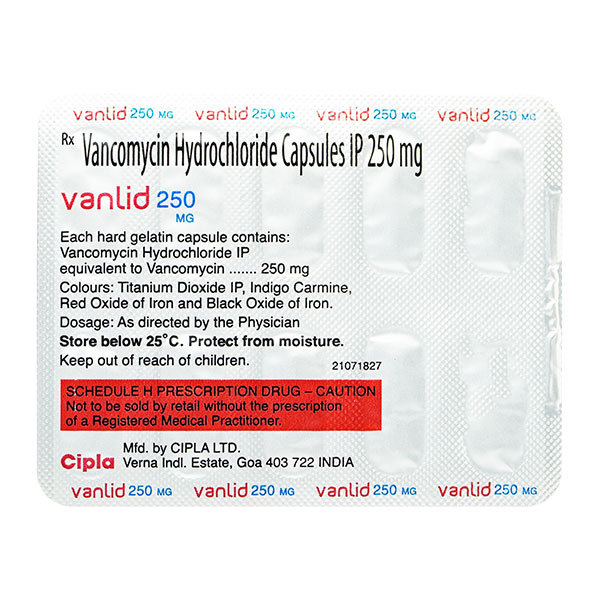Uvanco 250 Capsule
MRP ₹1180.6
(Inclusive of all Taxes)
₹177.1 Cashback (15%)
Provide Delivery Location
Online payment accepted
 Prescription drug
Prescription drugWhats That
Composition :
Manufacturer/Marketer :
Consume Type :
Return Policy :
About Uvanco 250 Capsule
Uvanco 250 Capsule belongs to the class of 'glycopeptide antibiotics', primarily used to treat bacterial infections of the intestines. It is effective in treating Clostridium difficile-associated diarrhoea and enterocolitis caused by Staphylococcus aureus.
Uvanco 250 Capsule contains 'Vancomycin' that has a bactericidal (kills bacteria) effect. It works by preventing bacterial cell wall synthesis, resulting in bacterial cell death. Uvanco 250 Capsule effectively treats infections caused by gram-positive and anaerobic (living without air) bacteria like Staphylococcus aureus (including methicillin-resistant isolates) and Clostridium difficile isolates.
Take Uvanco 250 Capsule as advised by your doctor. Common side effects of this medicine include abdominal pain, nausea, and low potassium levels. Most of these side effects do not require medical attention and gradually resolve over time. If these side effects persist longer, please consult your doctor.
Avoid taking Uvanco 250 Capsule if you are allergic to it. Inform your doctor of your complete medical history, including any liver/kidney diseases, gastrointestinal diseases (ulcerative colitis, Crohn's disease), and hearing problems. If you are pregnant or breastfeeding, consult your doctor before taking Uvanco 250 Capsule. Safety and effectiveness of Uvanco 250 Capsule in patients below 18 years of age have not been established.
Uses of Uvanco 250 Capsule
Directions for Use
Key Benefits
Uvanco 250 Capsule is a glycopeptide antibiotic that treats bacterial infections of the intestines. It contains Vancomycin, which works by destroying the bacterial cell. It is bactericidal in action and effectively treats infections caused by gram-positive and anaerobic (living without air) bacteria.
Storage
Drug Warnings
Do not use Uvanco 250 Capsule if you are allergic to Uvanco 250 Capsule or its components. Let your doctor know if you have liver or kidney, gastrointestinal, or hearing problems. Pregnant and breastfeeding women should consult their doctor before taking Uvanco 250 Capsule. Please avoid alcohol intake during treatment with Uvanco 250 Capsule to avail maximum benefits of the medicine and prevent the disease's worsening. Safety and effectiveness of Uvanco 250 Capsule in patients below 18 years of age have not been established.
Diet & Lifestyle Advise
- Wash your hands often to maintain cleanliness.
- Avoid sharing personal items like shaving razors.
- Include whole-grain foods like multigrain bread and brown rice in your diet.
- Taking probiotics after an antibiotic treatment reduces the risk of antibiotic-associated diarrhoea.
- Try taking yoghurt, cheese, sauerkraut, and kimchi that help restore the intestine's good bacteria.
- Include more fibre-enriched food in your diet that is easily digested by your gut bacteria. Fibre foods may also help restore healthy gut bacteria after a course of antibiotics.
- Avoid intake of alcoholic beverages as they can make you dehydrated and affect your sleep.
- Manage stress, eat healthily, drink plenty of water, exercise regularly, and get plenty of sleep.
Side Effects of Uvanco 250 Capsule
- Abdominal pain
- Nausea
- Low potassium levels
Habit Forming
Therapeutic Class
All Substitutes & Brand Comparisons
RX
Out of StockVantinel 250mg Capsule
₹1399
(₹125.91 per unit)
18% COSTLIERRX
Vanlid 250 mg Capsule 10's
Cipla Ltd
₹1627.5
(₹146.48 per unit)
37% COSTLIER
Author Details
We provide you with authentic, trustworthy and relevant information
FAQs
Drug-Drug Interactions Checker List
- FUROSEMIDE
Special Advise
- Monitoring kidney function is advised during therapy with Vancomycin in the older population.
- Regular assessment of auditory function is recommended in people who have hearing problems and take Vancomycin.
- Regular monitoring of potassium levels is advised.
Disease/Condition Glossary
Clostridium difficile-associated diarrhoea: This is caused by a bacterium known as Clostridium difficile (C. diff). It commonly affects people who use antibiotic medications. Symptoms of Clostridium difficile infection include diarrhoea/watery stools, high temperature, loss of appetite, sickness, and stomach ache. Treatment includes stopping the antibiotics that cause an infection, using an antibiotic course that controls the infection, and preventive measures like maintaining hygiene and cleanliness.
Enterocolitis: It is an inflammation of the digestive tract that involves enteritis of the small intestine and colitis of the colon. Symptoms include cramps, bloating, watery stools/diarrhoea, fever, tiredness, and stomach pain.

Have a query?
Alcohol
Safe if prescribed
Avoid taking alcohol while using Uvanco 250 Capsule since it may worsen the disease condition.
Pregnancy
Consult your doctor
During pregnancy, this medicine should be used only if clearly needed. Please consult your doctor before taking Uvanco 250 Capsule if you are pregnant or planning to conceive.
Breast Feeding
Consult your doctor
There is limited information on how Uvanco 250 Capsule affects breastfeeding. Please consult your doctor before taking Uvanco 250 Capsule if you are breastfeeding.
Driving
Safe if prescribed
Uvanco 250 Capsule usually does not interfere with your driving ability.
Liver
Consult your doctor
Inform your doctor if you have any history of liver diseases before taking Uvanco 250 Capsule.
Kidney
Consult your doctor
Inform your doctor if you have any history of kidney diseases before taking Uvanco 250 Capsule.
Children
Safe if prescribed
Safety and effectiveness of Uvanco 250 Capsule in patients below 18 years of age have not been established.








